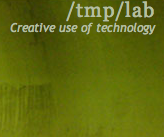Difference between revisions of "/tmp/bci/machine-learning"
(→Tools) |
|||
| Line 4: | Line 4: | ||
= Tools = | = Tools = | ||
| + | |||
| + | == pythinkgear == | ||
| + | |||
| + | Python library to gain direct real time access to the NeuroSky MindSet signals from python under Linux and MacOSX (or any system that can map a bluetooth device as a serial port). | ||
| + | |||
| + | Status: currently [https://github.com/ogrisel/pythinkgear being extended] to log the raw data using numpy / matplotlib | ||
== OpenViBE == | == OpenViBE == | ||
Latest revision as of 08:33, 13 June 2011
Contents
Goal
Experiment with basic brain reverse engineering: out of the raw signal of the brain (EEG, fNIRS, ...), try to identify stable correlation with mental activity (reading text, listening to music, programming, sleeping) so as to find more deterministic ways to use the kits to control devices or generate artistic outputs (music, video, ...).
Tools
pythinkgear
Python library to gain direct real time access to the NeuroSky MindSet signals from python under Linux and MacOSX (or any system that can map a bluetooth device as a serial port).
Status: currently being extended to log the raw data using numpy / matplotlib
OpenViBE
Graphical environment written in C++ and released under LGPL to build, test and apply EEG and MEG signal decoding / processing in realtime based on user defined scenarios. It provides various signal processing building blocks and a couple of machine learning classifiers (e.g. LDA).
scikit-learn
scikit-learn provides a rich tool box of machine learning algorithms implemented with python / numpy / cython. Approx 50% of the core developers are involved in applications of statistical learning for Neuro-Imaging research.
Some resources to get started:
- Official github source code repo
- Official website with documentation
- Tutorial on application of machine learning to neuroimaging by scikit-learn developers
People interested in this subproject
- Olivier Grisel (@ogrisel) - scikit-learn developer
- Add your name here
